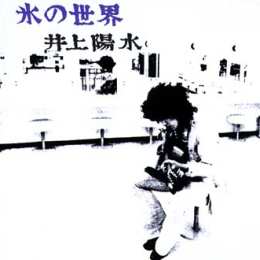Song Introduction (Kaerenai Futari)
Title: “Kaerenai Futari” (Title meaning: The Two Who Can’t Return)
Artist: Yosui Inoue
Lyrics and Composition: Yosui Inoue, Kiyoshiro Imawano
Label: Polydor Records
Overview:
This song was released on September 21, 1973, as the B-side of the single “Kokoro Moyou” and was included as the third track on the album Koori no Sekai (“The World of Ice”), released on December 1, 1973.
The album topped the Oricon annual charts in both 1974 and 1975, and became the first LP in Japanese music history to sell over one million copies by 1975.
The recording took place in London, with participation from international musicians and staff.
Article Sources:
・Koori no Sekai (“The World of Ice”) – Wikipedia
・Yosui Inoue – Wikipedia
Image Source:
・Yosui Inoue – Wikipedia (Cover art by Polydor, used under Fair Use)
About the Song
This song was created by Yōsui Inoue and Kiyoshiro Imawano1, before he became famous, in Inoue’s apartment.
I think it’s a masterpiece with a unique atmosphere, blending the distinct personalities of both artists.
The lyrics describe a situation where two lovers cannot return home, even as the night turns to dawn, as seen in the line, “Even the stars are beginning to go back, leaving behind the two who cannot return.”
This raises various images for the listener:
“do they not want to be apart, or are they having a forbidden love and escaping from their real lives?”
The beautiful sound and melody, combined with the poignant lyrics, work well together to draw listeners into a sentimental world.
Song Video
- Yosui Inoue – Koori no Sekai (“The World of Ice”) (Live) @ NHK Hall, 2014/5/22
Video Link - Kaerenai Futari (“The Two Who Can’t Return”) / Yosui Inoue & Kiyoshiro Imawano – link
Artist Introduction (Yōsui Inoue)
Artist: Yōsui Inoue
Real Name: Akimi Inoue
Date of Birth: August 30, 1948
Place of Birth: Iizuka City, Fukuoka Prefecture (formerly Kahō District, Fukuoka Prefecture)
Official Website: Yosui Inoue Official Website
Artist Trails
Yosui Inoue initially debuted in 1969 under the name “André Candre,” but he did not achieve commercial success and ended his activities shortly after.
He later moved to Polydor and re-debuted in 1971 under the name “Yosui Inoue.”
With the song “Jinsei ga Nido Areba” (“If Life Could Be Twice”), he established himself as a singer-songwriter, and his subsequent album Danzetsu and the single “Kasa ga Nai” (“No Umbrella”) were highly acclaimed.
In 1972, his single “Yume no Naka e” (“Into the Dream”) became a hit, and he achieved commercial success with the record-breaking sales of his 1973 album Koori no Sekai (“The World of Ice”), which became widely recognized.
In 1976, he founded For Life Records, marking the beginning of a new phase in his music career.
Despite a scandal involving a violation of the Cannabis Control Act, his 1978 album White was a hit.
In the 1980s, Inoue’s music style evolved, and he continued to produce hits such as “Wine Red no Kokoro” (“Wine Red Heart”) for Anzen Chitai in 1982 and “Isso Serenade” (“Serenade Anyway”) in 1984.
In 1988, he provided the song “Kon’ya, Watashi ni” (“Tonight, To Me”) for a Nissan Motors commercial.
In the 1990s, he returned to focusing on music, creating many timeless songs loved across generations.
Still active at the forefront of the music scene, Yosui Inoue continues to move and resonate with many people, leaving a lasting impact on the history of music.

Comment